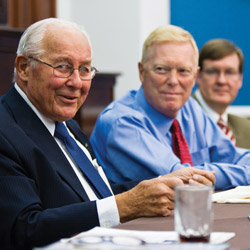
On June 24th in the U.S. Capitol building, Bradley’s Institute for Principled Leadership in Public Service, the Bipartisan Policy Center and the Dirksen Congressional Center co-hosted a freshman congressional luncheon. The highlighted guest speakers were Republican Bob Michel, who served as U.S. House Minority Leader for 14 years, and Democrat Dick Gephardt, who served as both U.S. House Majority Leader and Minority Leader during a 14-year span.
A bipartisan group of freshman congressional members attended from Hawaii to New York. Congressman Aaron Schock, who was instrumental in promoting the event to his colleagues, said, “Today’s highly charged political climate puts a premium on the ability of members to work across party lines. I am grateful that my fellow freshman members can hear from these two accomplished legislators.”
Former Republican Leader Michel joked that he had served in Congress for 38 years, always in the minority party. Yet, by forming good relationships with Democrats, he and President Ronald Reagan were able to get bipartisan support for tax cuts and defense policies that eventually led to the end of the Cold War. Michel stressed that many of the key votes during the Reagan presidency passed by just four or five votes, and the Republicans were significantly outnumbered in the House. “You have to take the time to sit in a room and listen to each other, and the president has to show leadership if you want to get bipartisan results in Congress,” Michel told the group.
Former Democratic Leader Gephardt, who served in Congress for 28 years, then spoke fondly of Michel: “Bob and I met five times a day…He is a decent, wonderful human being…We did not agree on everything, but we found a way to work together for the good of the country.” Gephardt asked the freshman members whether they had come to Congress for purely political reasons or to help solve the major problems our country faces. “On the big stuff that really counts, you need to reach across the political aisle to help move our country forward,” Gephardt urged the new congressional members.
Michel and Gephardt both reflected on the budget summit that President George H.W. Bush held with bipartisan congressional leaders at Andrews Air Force Base in the late 1980s. The leaders met for a week, listened to each other, and eventually came out with a compromise deficit reduction plan that included tax increases and budget reductions. The two leaders then answered a series of questions from the freshman congressional members.
Also at the luncheon, two papers were distributed to congressional members:
(1) Effective Bipartisan Leadership/Lessons Learned from the Landmark Civil Rights Act of 1964 presented by IPL
(2) The Civility Initiative in Congress, 1996-2004 presented by the Dirksen Center.
These papers can be accessed at bradley.edu/dotAsset/101666.pdf.
At the conclusion of the lunch, it was agreed that future bipartisan gatherings should be pursued. The hope is that the freshman class of the 111th Congress can begin the dialogue, form genuine bipartisan relationships, and eventually lead the way. iBi

